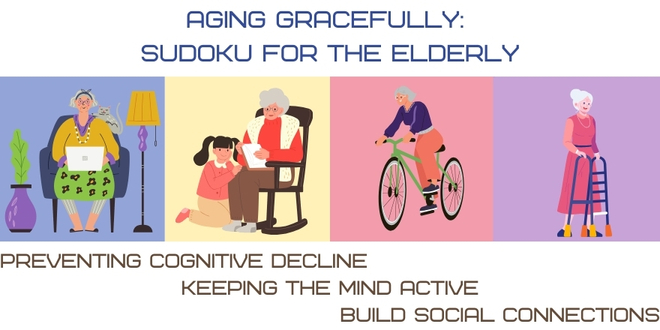Table of Contents
- Introduction: A Simple Game with Surprising Benefits
- Boosting Brainpower: The Cognitive Benefits
- Improved Memory
- Enhanced Problem-Solving Skills
- Increased Focus
- Mental Health Matters: Sudoku and Emotional Well-Being
- Stress Reduction
- Building Confidence
- Mindfulness Practice
- Aging Gracefully: Sudoku for the Elderly
- Preventing Cognitive Decline
- Keeping the Mind Active
- Social Connection
- Fun for All Ages: Sudoku’s Universal Appeal
- For Kids
- For Adults
- For Families
- Scientific Backing: What Research Tells Us
- Getting Started: Tips for Maximum Benefit
- Conclusion: More Than Just a Game
- FAQ Section: Your Questions Answered
1. Introduction: A Simple Game with Surprising Benefits
Sudoku may look like just a grid of numbers, but beneath the surface lies a fascinating array of benefits backed by science. Whether you’re a casual puzzler or a dedicated enthusiast, Sudoku has something for everyone. But did you know it can sharpen your mind, reduce stress, and even slow cognitive decline? Let’s uncover what makes Sudoku more than just a game.
2. Boosting Brainpower: The Cognitive Benefits
Science suggests that playing Sudoku is like a gym workout for your brain.
- Improved Memory: Regularly solving Sudoku strengthens short-term memory. Each puzzle demands that you recall specific numbers while keeping track of potential options for other cells. This mental juggling improves your brain’s ability to store and retrieve information.
- Enhanced Problem-Solving Skills: Sudoku requires logic-based thinking. By analyzing the puzzle and deducing the placement of each number, you hone your problem-solving abilities—a skill that translates well into real-life challenges.
- Increased Focus: Staying focused on completing a Sudoku grid trains your mind to block out distractions. This ability to concentrate can be helpful in daily tasks, work, or studies.

3. Mental Health Matters: Sudoku and Emotional Well-Being
Sudoku does more than train your brain; it also supports emotional wellness.
- Stress Reduction: Sudoku has a calming effect on the mind. Solving puzzles provides a sense of control and order, which can counteract daily stressors.
- Building Confidence: Completing a challenging Sudoku puzzle leaves you with a sense of accomplishment. This little victory boosts your confidence and motivates you to take on other challenges.
- Mindfulness Practice: As you focus on the grid, you naturally tune out external worries. Sudoku encourages living in the present moment, fostering mindfulness.
4. Aging Gracefully: Sudoku for the Elderly
For seniors, Sudoku isn’t just a game—it’s a tool for maintaining mental sharpness.
- Preventing Cognitive Decline: Studies indicate that engaging in activities like Sudoku can delay cognitive decline and reduce the risk of dementia or Alzheimer’s disease. Learn more about Alzheimer’s disease here.
- Keeping the Mind Active: Sudoku keeps neural pathways active and engaged. Solving puzzles challenges the brain, helping it stay sharp with age.
- Social Connection: Playing Sudoku in a group setting, such as a club or family gathering, encourages interaction and reduces feelings of isolation—a common issue among older adults.

5. Fun for All Ages: Sudoku’s Universal Appeal
Sudoku isn’t limited by age or skill level, making it a universal favorite.
- For Kids: Sudoku helps children develop patience, critical thinking, and number recognition. Introducing kids to simpler puzzles can foster a lifelong love of problem-solving.
- For Adults: Whether during a coffee break or on a long commute, Sudoku offers adults a chance to relax while sharpening their minds.
- For Families: Working together to solve Sudoku puzzles can be a fun bonding activity that teaches teamwork and collaboration.
6. Scientific Backing: What Research Tells Us
The benefits of Sudoku aren’t just anecdotal; they’re supported by research.
Neuroscience has uncovered how Sudoku stimulates the prefrontal cortex, the part of the brain responsible for higher-order functions like decision-making and planning. Studies also show that people who engage in puzzles like Sudoku experience better memory and mental agility over time.
Want to explore the science further? Read this study on cognitive training.
7. Getting Started: Tips for Maximum Benefit
To make the most of Sudoku’s benefits, it’s important to approach the game wisely.
- Start Simple: Choose beginner-level puzzles to build confidence and learn the basics.
- Be Consistent: Solving one puzzle daily can yield long-term benefits. Consistency matters more than complexity.
- Level Up Gradually: As you get comfortable, challenge yourself with harder puzzles to keep your mind sharp and engaged.
8. Conclusion: More Than Just a Game
Sudoku may seem like a simple pastime, but science reveals it’s much more than that. From boosting brainpower to enhancing emotional well-being and helping seniors stay sharp, Sudoku’s benefits are undeniable. So why not make Sudoku a part of your daily routine? Grab a puzzle today and experience these incredible benefits for yourself.
9. FAQ Section: Your Questions Answered
Q1: Can Sudoku help prevent memory loss?
A: While no activity can guarantee prevention, research shows Sudoku can delay memory decline by keeping the brain active and engaged.
Q2: How often should I play Sudoku to see the benefits?
A: Even solving one puzzle a day can make a noticeable difference. The key is consistency.
Q3: Is Sudoku better than other brain-training activities?
A: Sudoku’s unique mix of logic, pattern recognition, and focus makes it an excellent choice, though combining it with other activities can provide a well-rounded brain workout.
Q4: Can children benefit from Sudoku too?
A: Absolutely! It’s a great way for kids to build patience, problem-solving skills, and a love for numbers.
